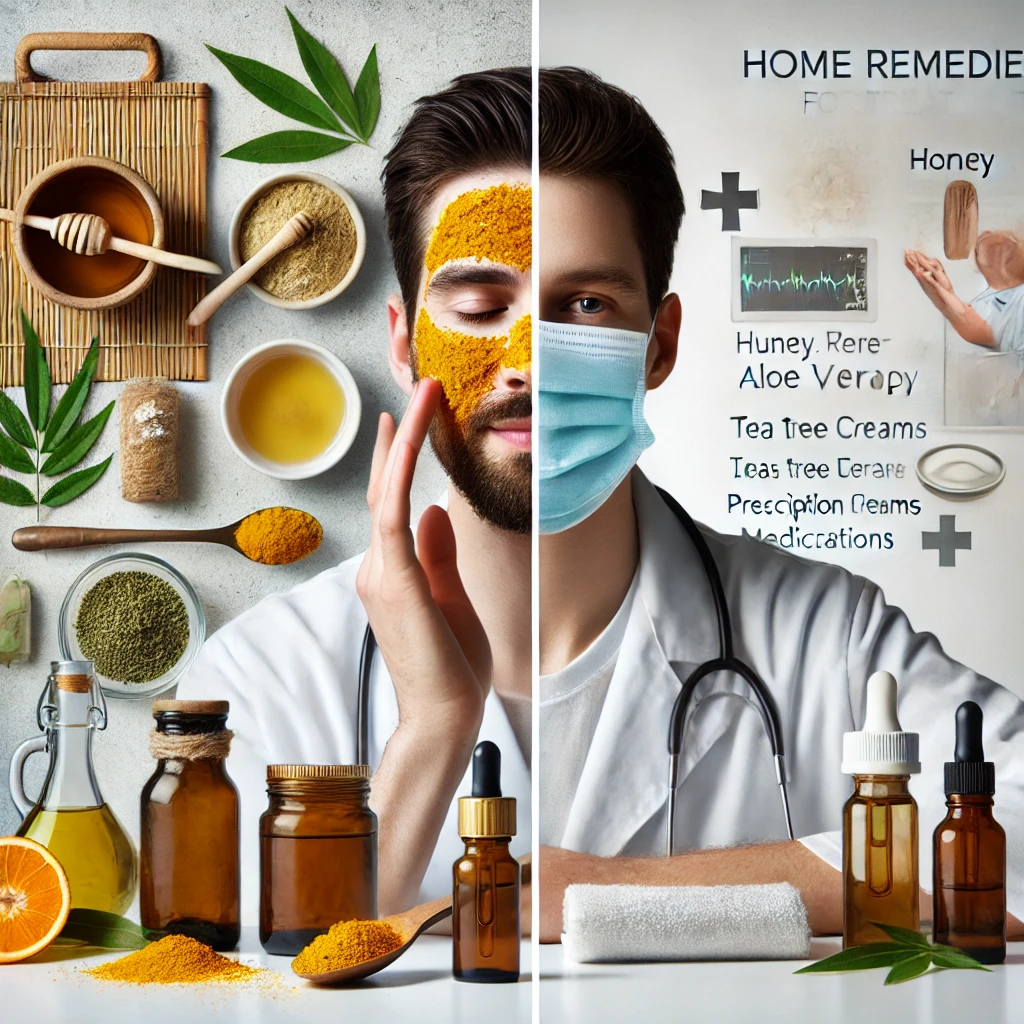
What is Acne?
Acne is a common skin condition that occurs when hair follicles become clogged with oil, dead skin cells, and bacteria. It can manifest as whiteheads, blackheads, pimples, cysts, or nodules, often appearing on the face, chest, shoulders, and back. Acne affects people of all ages, but it is most prevalent among teenagers due to hormonal changes.
Causes of Acne
Several factors contribute to the development of acne, including:
- Excess Sebum Production – The sebaceous glands produce oil (sebum) to keep the skin hydrated. However, excessive sebum production can clog pores and lead to acne.
- Clogged Hair Follicles – Dead skin cells that do not shed properly can mix with sebum and block hair follicles, leading to breakouts.
- Bacteria (Propionibacterium acnes) – The presence of acne-causing bacteria in clogged pores can trigger inflammation and infection, worsening acne.
- Hormonal Fluctuations – Hormones, particularly androgens, increase sebum production, which can cause acne. This is common during puberty, menstruation, pregnancy, and stress.
- Dietary Factors – High-glycemic foods, dairy products, and processed foods may contribute to acne in some individuals.
- Lifestyle Choices – Poor skincare habits, excessive makeup use, lack of hygiene, and high stress levels can exacerbate acne.
- Genetics – If your family has a history of acne, you may be more prone to developing it.
Home Remedies for Acne: Natural and Affordable
Home remedies for acne are often inexpensive and rely on natural ingredients. While some remedies may help reduce inflammation and bacteria, their effectiveness varies from person to person. Here are some of the most popular home remedies:
1. Tea Tree Oil
Tea tree oil has antimicrobial properties that can help fight acne-causing bacteria. Diluting it with a carrier oil and applying it to acne spots may reduce inflammation and redness.
2. Honey and Cinnamon Mask
Both honey and cinnamon have antibacterial and anti-inflammatory properties. Mixing them into a paste and applying it to the skin can help soothe acne breakouts.
3. Apple Cider Vinegar
Apple cider vinegar contains acetic acid, which may kill bacteria and balance the skin’s pH. However, it must be diluted before application to avoid irritation.
4. Aloe Vera
Aloe vera has soothing and healing properties that may help reduce redness and swelling. It also contains salicylic acid, which is known to help with acne.
5. Green Tea
Rich in antioxidants, green tea can be used topically or consumed to reduce inflammation and lower sebum production.
6. Dietary Changes
Avoiding processed foods, dairy, and high-glycemic-index foods while consuming a balanced diet rich in fruits, vegetables, and healthy fats can improve skin health.
7. Ice Therapy
Applying ice to inflamed pimples can help reduce swelling and redness temporarily.
Limitations of Home Remedies
While home remedies can provide relief for mild acne, they often lack scientific backing and are not strong enough for moderate to severe cases. Some ingredients may also cause irritation or allergic reactions, worsening the condition.
Medical Treatments: Dermatologist-Recommended Solutions
For those struggling with persistent or severe acne, medical treatments offer a more reliable and science-backed solution. Here are some of the most commonly prescribed treatments:
1. Topical Medications
a) Benzoyl Peroxide
An effective over-the-counter treatment, benzoyl peroxide kills acne-causing bacteria and helps unclog pores.
b) Retinoids (Tretinoin, Adapalene, and Tazarotene)
Retinoids speed up cell turnover, preventing clogged pores and reducing inflammation. They are available in both over-the-counter and prescription strengths.
c) Antibiotics (Clindamycin, Erythromycin)
Topical antibiotics help reduce bacterial growth and inflammation when used in combination with other treatments.
2. Oral Medications
a) Oral Antibiotics (Doxycycline, Minocycline, Tetracycline)
These are prescribed for moderate to severe acne to reduce bacteria and inflammation.
b) Hormonal Treatments (Birth Control Pills, Spironolactone)
For females with hormonal acne, birth control pills and spironolactone help regulate hormones that contribute to acne.
c) Isotretinoin (Accutane)
A powerful oral retinoid used for severe cystic acne, isotretinoin reduces oil production, inflammation, and acne scars.
3. Professional Dermatological Procedures
a) Chemical Peels
Chemical peels use acids (like salicylic acid or glycolic acid) to exfoliate the skin and unclog pores.
b) Laser and Light Therapy
These treatments target bacteria, reduce inflammation, and improve skin texture over time.
c) Cortisone Injections
For painful cystic acne, cortisone injections can rapidly reduce swelling and accelerate healing.
d) Extraction Procedures
Dermatologists may perform extractions to safely remove blackheads and whiteheads without causing scarring.
If you’re looking for the best acne treatment in Chandigarh at Gleuhr, you can consult their experienced dermatologists for advanced and personalized acne solutions.
Which Treatment is Best for You?
Choosing between home remedies and medical treatments depends on the severity of your acne, skin type, and how well your skin responds to different treatments. Here’s a general guideline:
- Mild Acne – Home remedies and over-the-counter topical treatments may work.
- Moderate Acne – Combination therapy with prescription topicals and oral medications is recommended.
- Severe or Cystic Acne – Professional dermatological treatments and stronger medications like isotretinoin are usually necessary.
Combining Home Remedies with Medical Treatments
In some cases, home remedies can complement medical treatments. For example:
- Using aloe vera alongside prescribed treatments to reduce irritation.
- Drinking green tea while using oral antibiotics to help with inflammation.
- Applying honey masks to soothe skin between medical treatments.
Conclusion
Both home remedies and medical treatments have their place in acne management. While natural remedies can help with mild acne, medical treatments offer faster and more effective results, especially for moderate to severe cases. Consulting a dermatologist is always the best approach to determine the most suitable treatment for your skin type and condition. If you’re struggling with acne, consider reaching out to a qualified dermatologist to receive personalized advice and treatment.